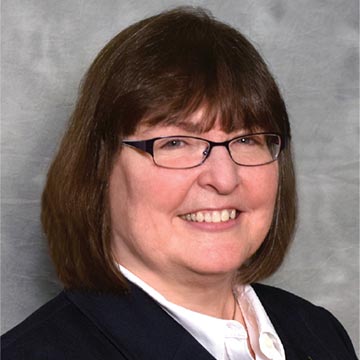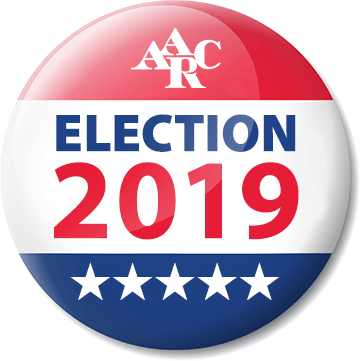Vice President – Internal
Cheryl Hoerr, MBA, RRT, FAARC
Phelps County Regional Medical Center
Director, Respiratory Services
Member Since: 1986
AARC Activities:
- Member, AARC Board of Directors, 2014-present
- Chair, Management Specialty Section, 2014-present
- Member, Benchmarking Committee, 2010-present
- Chair, Program Committee, 2011-2013
- Member, Program Committee, 2009-2010
- Interim Chair, Management Section, 2010
- Member, Management Section
- Member, Sleep Section
- Member, Diagnostics Section
Affiliate Activities:
- President, Missouri Society for Respiratory Care, 2012-2014; President-Elect, 2010-2012; Director at Large, 2007-2010; District I Vice President, 2006-2007; District I Secretary, 2004-2006
- Board of Directors, Missouri Society for Respiratory Care, 2007-present
- Chair, Missouri Society for Respiratory Care Annual Fall Specialty Conference, 2010-2012
Related Organizations:
- Team Co-Chair, Association for the Advancement of Medical Instrumentation (AAMI), National Coalition to Promote the Safe Use of Complex Healthcare Technology, 2017-present
- Reviewer, Respiratory Care Journal, 2012-present
- Chair, Community Advisory Board, Rolla Technical Institute, 2009-2011; Member 2009-2016
- Member, Community Advisory Board, Missouri State University-West Plains, 2012-present
Education:
- BSRT, Rockhurst University, Kansas City, 1981
- BS Biology, Rockhurst University, Kansas City, 1981
- MBA Health Care Management, University of Phoenix, 2006
- RRT
- CPFT
- FAARC
Publications:
- Utilizing respiratory therapists to reduce costs of care. Respiratory Care 2018; 63:102-117.
- Therapist-directed protocols designed with health-care reform in mind. Respiratory Care 2015; 60(2):304-305.
- Do we have the equipment to safely support the pediatric patient with sleep disorders? AARC Times 2010; 34(10):10-12.
- Titrating oxygen and positive pressure: practical considerations for the respiratory therapist. AARC Times 2010; 34(8):8-1.
- CPAP – is all pressure created equal? AARC Times 2010; 34(4):30-32.
- Infection control: minimizing the risk of healthcare acquired infection. RT Magazine. July 2010; 8-10.
Elections Committee Questions:
What AARC or Chartered Affiliate offices/positions have you held where you feel you made a significant contribution to our profession? What is the contribution and how will you apply it to your new position, if elected?
My work with the AAMI Coalition to Promote the Safe Use of Complex Healthcare Technology is aimed at improving patient safety. Through the use of complex technology, RTs have the ability to improve patient outcomes. But this technology can also be the cause of significant injuries if not used correctly. Our goals are to establish best practices in several key areas including evaluation of the safety of the technology before it even enters the organization, ensuring adequate resources are dedicated to training, and to develop a standard process to promote a high level of proficiency amongst end users of the technology. In my position as VP of Internal Affairs I will publicize the program and work with Association committee representatives, as requested, to devise a plan their members could use to incorporate the program into their practice. The data shows that health care still has an unacceptably high number of errors and programs designed to reduce this error rate must be a top priority.
What experience would you bring to the AARC to accomplish the goals set out by President Walsh?
My communication skills will be effectively utilized to deliver the messaging the AARC President wants to communicate. I have enjoyed delivering updates on the state of the management section to the House of Delegates. I have used those updates to discuss the challenges facing our respiratory managers, and I have also presented a vision of the respiratory therapist of the future with an essential role in providing pulmonary disease management in a variety of non-acute care settings. Through my participation in the Student Seminar at the AARC Congress I have had the pleasure of interacting with a large number of future RTs, and subsequently mentoring several through their resume, job search, and interview process. My involvement with these students has provided me the opportunity to tout the advantages of AARC membership and to provide guidance on the ways in which these students could become involved supporters of their chosen profession.
What ideas do you have to attract non-members to join the AARC?
While we should always emphasize the benefits of membership to each RT, we should also more clearly define why the AARC needs RTs to become members (e.g., a stronger voice in Washington, a more cohesive approach to the changes our profession is experiencing, etc.). To paraphrase President Kennedy, ask not what your profession can do for you, but what you can do for your profession. I also believe we could establish a formal mentoring program using long-term members for outreach to new members and students. A referral bonus could be implemented for current members who would accumulate points to be redeemed for a variety of discounts or SWAG. The AARC could recruit committee members by posting openings for all membership to consider; this would be a way to encourage contributions from members who want to be more involved but are uncertain of where to start.
Role-Specific Questions:
How would you, as a member of the AARC Executive Committee, work to move the profession forward based on the work done by our current and previous presidents?
Henry Ford once said “If everyone is moving forward together, then success takes care of itself.” I believe the Board has made great strides in collaborating with various groups who are also heavily invested in moving our profession forward, and I will continue to support these types of collaborations. The joining of forces in a common goal means less duplication of efforts and more resources dedicated toward expanding our professional practice and improving our professional visibility. I also support the efforts aimed at proving our professional value to patients. The respiratory profession currently suffers from a lack of good evidence to prove the patient care provided by RTs is effective and efficient. I co-authored a systematic review that identified the gaps in our professional research initiatives and also suggested standardized outcomes measures to improve comparability between studies. I will encourage the next generation of respiratory researchers to use AARC grant funding to prove our value.







